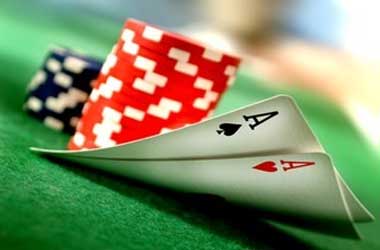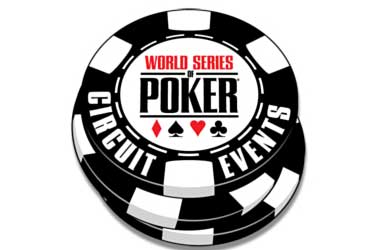A Beginners Guide To Playing Poker For The First Time
 The roots of poker dates back to the sixteenth century when the Germans played a game with cards called “Pochen” wherein bluffing was an integral part of the game.
The roots of poker dates back to the sixteenth century when the Germans played a game with cards called “Pochen” wherein bluffing was an integral part of the game.
The game spread across Europe and the French variation of the game (called “Poque”) spread to New Orleans in North America and was popular on the riverboats of the Mississippi river.
It was in the 1830’s that Poque was amended with some tweaks and it eventually became known as Poker. Of course, even today there are several versions and variations of Poker.
In today’s world, Poker is arguably one of the most popular card games and is played not only in casinos and private homes, but also in online poker rooms all over the world.
The beautiful thing about Poker is that you can play it for laughs without putting anything on the line except a some valueless poker chips, or you could play on a professional scale where there are thousands and sometimes millions at stake.
While luck is definitely a factor, Poker is undoubtedly also a game of skill, knack, psychology and tact. Each player can make or break his or her own fate while playing poker.
Having said that, let us take a look at some of the basics of Poker and how to play it.
The Pack
Poker may be played with just a standard pack of 52 cards, but in all casinos these days, the common practice is to use two packs of cards that can be easily differentiated from each other (usually in terms of colour) in order to expedite the game. The way it works is that when one pack is being dealt out to the players seated at the table, the other pack is simultaneously being prepped for the next round for dealing. The pack which is not in play is usually prepared by the previous dealer for the next round.
The common practice when it comes to cutting the pack prior to dealing is not done by either of the dealers themselves, but usually by the player seated to the left of the dealer.
It is allowed in most non – virtual casinos and Poker clubs for any of the players to request for new decks of cards at any point during the game. When the two new decks are introduced, the plastic wrapping around the deck must be removed and the new deck must be unsealed for the first time in a manner where it is clearly visible to all players at that particular table.
Hands and scores
In Poker, hands have rankings and some are better than others. Obviously, you do not show your hand until the very end or you do not show it at all. So, while the game does depend on what hand you have, you can still make the most of whatever hand you are dealt by the way you place bets, by bluffing and by using tact and strategy depending on others’ moves.
From highest to lowest, here is the ranking of the different hands in Poker. Please note that while this remains the same for most popular versions of Poker, there are still some exceptions.
| Ranking | Hand | Example of Hand |
|---|---|---|
| 1 | Five of a kind | 10 of Spades, 10 of Diamond, 10 of Hearts, 10 of Clubs, Wild card |
| 2 | Straight Flush | 10 of Hearts, 9 of Hearts, 8 of Hearts, 7 of Hearts, 6 of Hearts |
| 3 | Four of a Kind | 3 of Spades, 6 of Spades, 10 of Spades, Queen of Spades |
| 4 | Full House | 8 of Hearts, 8 of Clubs, 8 of Diamonds, 6 of Hearts, 6 of Clubs |
| 5 | Flush | 10 of Hearts, 5 of Hearts, King of Hearts, Jack of Hearts, 2 of Hearts |
| 6 | Straight | 9 of Hearts, 8 of Clubs, 7 of Diamonds, 6 of Spades, 5 of Hearts |
| 7 | Three of a kind | Jack of Clubs, Jack of Diamonds, Jack of Spades, 4 of Hearts, Ace of Spades |
| 8 | Two Pairs | Queen of Clubs, Queen of Hearts, 7 of Clubs, 7 of Hearts, 4 of Hearts |
| 9 | One Pair | 7 of Hearts, 7 of Clubs, 10 of Spades, 2 of Hearts, Jack of Clubs |
| 10 | No Pair | 6 of Spades, Jack of Hearts, 3 of Diamonds, Queen of Clubs, 10 of Clubs |
Betting in Poker
As mentioned, the hand does have a big part to play, but the hand is not everything. This is the beauty of Poker, you can have a really bad hand and still win the round or you can have a pretty good hand and still manage to lose the pot and more. It all comes down to betting. Betting is really the key to poker.
In fact, people say that the game of Poker at its core is one of chip management, and betting is how you manage your chips. When every hand is dealt, each player will have an opportunity to bet on their hands with every betting interval. The key is to lose as little as you can when you have a poor hand and to win as much as you can when you have a solid hand. This requires strategic and critical thinking, and also experience.
In most forms of poker, players are required to put in a minimum table bet or contribution called an “ante” into the pot to get the ball rolling. Then onwards, every betting round begins when a player actually makes a bet, once a player makes a bet, the other players need to match this bet if they wish to stay in the game. They could also put in a higher amount or value of coins than the player who bet – this is called a raise. Lastly, players who do not wish to match the bets (usually those who believe they don’t have a hand that they can work with) can “fold”. Folding is basically giving away your hand and excusing yourself from that round, players who fold will only be included in the next round when the dealer deals the cards again.
A player that folds or drops will lose all the chips that they have put into the pot thus far. If a player is not willing to put into the pot at least a minimum of what he previous player bet, then he or she should fold.
However, if a player feels like they have a good hand or that the other player might only be bluffing, then they can go with their gut and continue to put in chips and even raise them until the betting rounds come to an end. Once the betting has ended, it is time to show. All players who have not folded will have to expose their hands and depending on the rankings of the hand, the player with the best hand will grab all of the pot.
Paul Butcher is a works as professor during the day and currently contributes to write articles for top10pokerwebsites.net during his time off. Visit Paul’s google+ page here
Trending News
-

-
 12 November, 2025 Doug Ramirez
12 November, 2025 Doug Ramirez -

-
 8 October, 2025 Doug Ramirez
8 October, 2025 Doug Ramirez -
 24 September, 2025 Doug Ramirez
24 September, 2025 Doug Ramirez -
 10 September, 2025 Paul Butcher
10 September, 2025 Paul Butcher -

-
 23 July, 2025 David Walker
23 July, 2025 David Walker -

-
